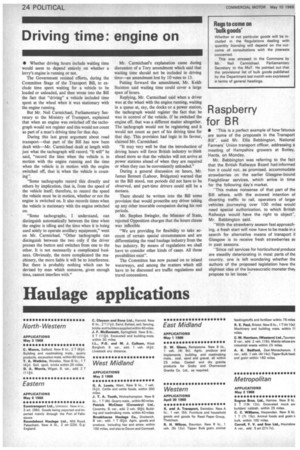Driving time: engine on
Page 26

If you've noticed an error in this article please click here to report it so we can fix it.
• Whether driving hours include waiting time would seem to depend entirely on whether a lorry's engine is running or not.
The Government resisted efforts, during the Committee Stage of the Transport Bill, to exclude time spent waiting for a vehicle to be loaded or unloaded, and then wrote into the Bill the fact that "driving" a vehicle included time spent at the wheel when it was stationary with the engine running.
But Mr. Neil Carmichael, Parliamentary Secretary to the Ministry of Transport, explained that when an engine was switched off the tachograph would not register and this would not count as part of a man's driving time for that day.
During this last great argument about road transport—that part of the Bill has now been dealt with—Mr. Carmichael dealt at length with just what the tachograph will record. "It will" he said, "record the time when the vehicle is in motion with the engine running and the time when the vehicle is in motion with the engine
switched off, that is when the vehicle is coasting".
"Some tachographs record this directly and others by implication, that is, from the speed of the vehicle itself; therefore, to record the speed the vehicle must be in motion, whether or not the engine is switched on. It also records times when the vehicle is stationary with the engine switched on.
"Some tachographs, I understand, can distinguish automatically between the time when the engine is idling and the time when it is being used solely to operate ancillary equipment," went on Mr. Carmichael. "Other tachographs can distinguish between the two only if the driver presses the button and switches from one to the other. It is not necessarily a complicated business. Obviously, the more complicated the machinery, the more liable it will be to interference. But there is probably nothing which can be devised by man which someone, given enough time, cannot interfere with." Mr. Carmichael's explanation came during discussion of a Tory amendment which said that waiting time should not be included in driving time—an amendment lost by 10 votes to 13.
Putting forward the amendment, Mr. Keith Stainton said waiting time could cover a large span of hours.
Replying, Mr. Carmichael said when a driver was at the wheel with the engine running, waiting in a queue at, say, the docks or a power station, the tachograph would register the fact that he was in control of the vehicle. If he switched the engine off, that was a different matter altogether. The tachograph would not be registering and it would not count as part of his driving time for that day. This provision had logic in its favour, claimed Mr. Carmichael.
"It may very well be that the introduction of driving hours will force British industry to think ahead more so that the vehicles will not arrive at power stations ahead of when they are required or when they can be conveniently unloaded."
During a general discussion on hours, Mr. James Bennett (Labour, Bridgeton) warned that as the Bill stood, rest periods did not have to be observed, and part-time drivers could still be a menace.
There should be written into the Bill some provision that would proscribe any driver taking up any other insurable occupation during his rest periods.
Mr. Stephen Swingler, the Minister of State, rejected Opposition charges that the hours clause was inflexible.
"We are providing for flexibility to take account of certain special circumstances and are differentiating the road haulage industry from the bus industry. By means of regulations we shall have to consider other kinds of cases. All those possibilities exist".
The Committee has now passed on to inland waterways, and among the matters which still have to be discussed are traffic regulations and travel concessions.












































































































